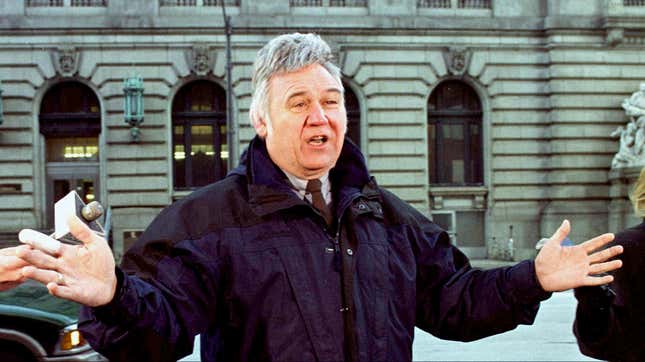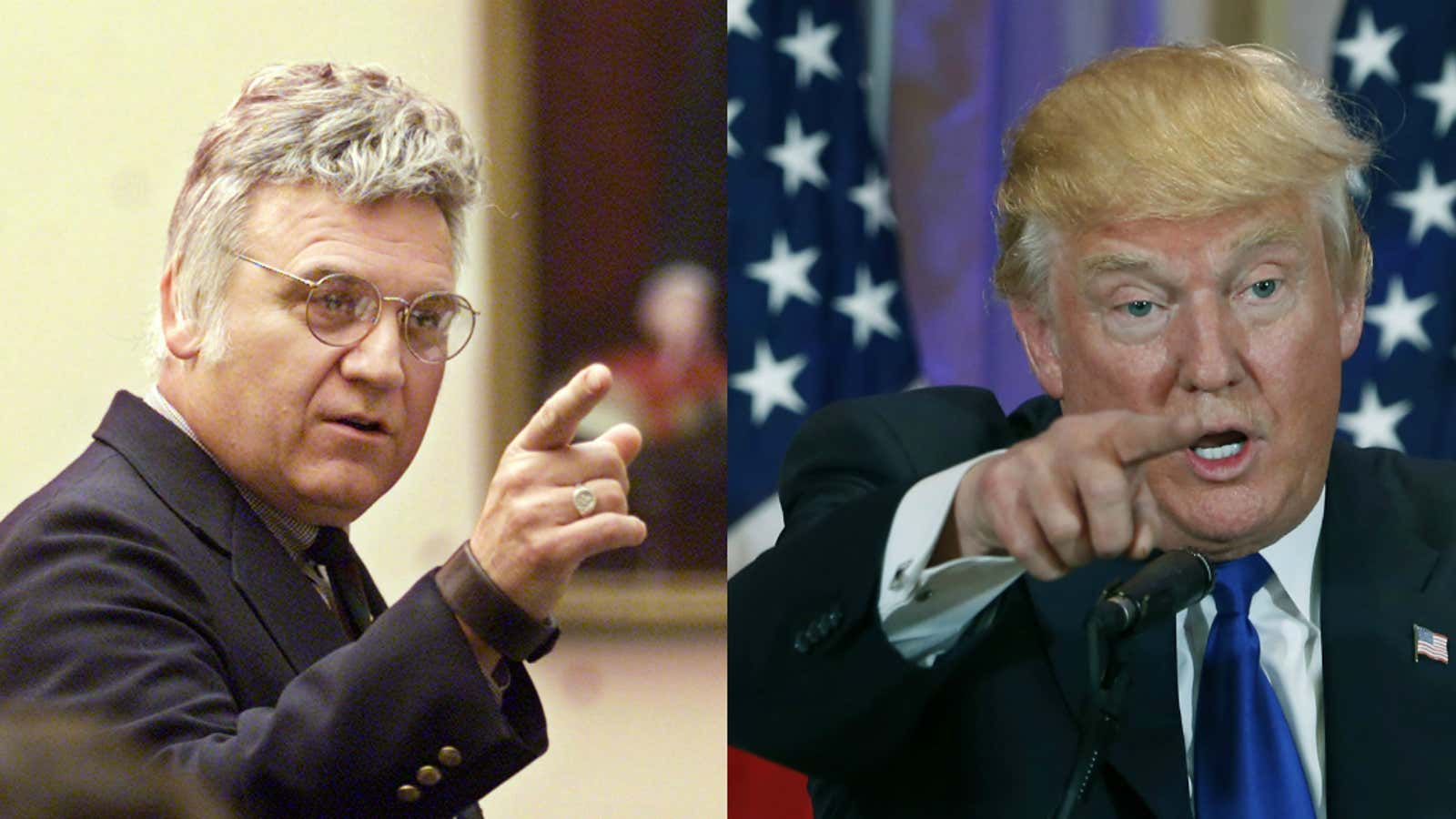Youngstown, Ohio
Donald Trump is deadlocked with John Kasich for the winner-take-all Ohio Republican primary election, on March 15, according to the polls. It’s obvious what Kasich’s big advantage is. He’s the state’s governor, one so popular that, in 2014, he won nearly two-thirds of the votes. But at least in Ohio’s northeastern corner, Trump may have a surprising edge: his uncanny resemblance to the state’s foul-mouthed and once-popular former Congressman, Jim Traficant.
“The difference between them is Donald Trump wears better suits and has a billion dollars,” says David Betras, Democratic party chair for Mahoning County, where Youngstown is located. Betras says he expects between 10% and 20% of the county’s Democratic primary voters to “jump ship” and vote for Trump. An uptick in early voting suggests that’s already happening, he says.
“What I believe is primarily drawing those voters to vote for Donald Trump is our former congressman Jim Traficant—he was very much a populist candidate, and if you watch how Trump and Traficant speak, it’s very similar,” says Betras. ”Traficant talked about sending the national guard to the border, about trade, he used foul language. People really liked how he stood up to the establishment, though of course his party was the Democrats.”
Even for non-natives, it’s not hard to see parallels. First, there’s the hair—the cottony bouffants for which both Trump and Traficant are famed. (Traficant’s was ultimately revealed to have been a toupee.)

Then there’s the bleeped-out rhetorical style both men favor. (Note: though Traficant died in 2014 from injuries incurred when his tractor flipped over on him, for convenience, we’re going to use the present-tense.) Traficant launched his political career as sheriff of Youngstown, where he was famed for his insouciant way with curses. When the FBI brought what seemed like an ironclad racketeering case linking him with the Mafia, Traficant, representing himself, told the jury that ”I got inside of the mob…. I fucked the mob,” as David Grann details in his classic profile of Youngstown and Traficant. After the jury aquitted him. Youngstown cheered. Traficant went on to win a seat in the US Congress, which he held for 16 years.
But the similarity isn’t just superficial. Like Trump, Traficant championed working-class Americans.
Once a steelmaking powerhouse, Youngstown is the “poster child for deindustrialization,” as John Russo, a longtime resident of the city and a visiting scholar at Georgetown University, put it (pdf). In the early 1980s, Traficant won the community’s loyalty when he refused to foreclose on the homes of sacked steelworkers. He couldn’t stop the layoffs, though. By the end of that decade, Youngstown had lost an estimated 50,000 jobs in steel and related industries. Once in Congress, Traficant was prone to populist rants, particularly against free-trade deals that had moved even more manufacturing jobs overseas. Here he is on the North American Free Trade Agreement, one of Trump’s big bugbears (at about 3:10):
Traficant had this to say about China:
Mr. Speaker, China’s trade surplus has ballooned to over $1 billion a week, and China is doing it illegally: prison labor, slave wages at 17 cents an hour, illegal dumping, trade barriers. When confronted, China thumbs their nose right in our faces. In fact, they now say the real trade deficit in America is only pennies on the dollar with China…. Congress should stop coddling China. This is not about trade anymore. It is about national security. And a communist nation is ripping off Uncle Sam.
Of course, there are some major differences. Trump doesn’t clown around like Traficant liked to do on the House floor—such as when he admitted to doing his hair with a weedwhacker:
In 2002, Traficant was expelled from Congress on corruption charges—he boasts the dubious accomplishment of being only the second person since the Civil War to have been kicked out—for which he spent more than seven years in prison.
Still, Traficant’s “tell it like it is” manner was so valued by his community that he won 15% of the vote in his district’s 2002 Congressional race even though he was in prison.
“I think he can get just as much done from prison as anyone else who takes his job,” a Youngstown retired electrical worker said at the time. “[If Traficant loses,] I think our economy will be hurting. I think unemployment will be on the rise.”
Youngstown has indeed continued to hurt. The area’s unemployment rate continues to be more than two percentage-points higher than Ohio’s. In nearby Canton, an industrial center similarly hard-hit, Trump’s railing against free-trade with China and Mexico seems to be winning over traditionally Democratic steelworkers.
“A lot find him refreshing,” Keith Strobelt, a political director for the United Steelworkers local union in Canton, told Reuters. “He says a lot of things they say around their dinner tables.”




